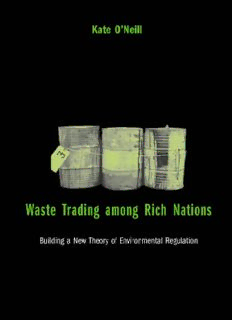
Waste Trading among Rich Nations: Building a New Theory of Environmental Regulation (American and Comparative Environmental Policy) PDF
Preview Waste Trading among Rich Nations: Building a New Theory of Environmental Regulation (American and Comparative Environmental Policy)
Waste Trading among Rich Nations American and Comparative Environmental Policy Sheldon Kamieniecki and Michael E. Kraft, editors Critical Masses: Citizens, Nuclear Weapons Production, and Environmental Destruction in the United States and Russia Russell J. Dalton, Paula Garb, Nicholas P. Lovrich, John C. Pierce, and John M. Whiteley Toward Sustainable Communities: Transition and Transformations in Environmental Policy Daniel A. Mazmanian and Michael E. Kraft, editors Domestic Sources of International Environmental Policy: Industry, Environmentalists, and U.S. Power Elizabeth R. DeSombre Waste Trading among Rich Nations: Building a New Theory of Environmental Regulation Kate O’Neill Waste Trading among Rich Nations Building a New Theory of Environmental Regulation Kate O’Neill The MIT Press Cambridge, Massachusetts London, England ( 2000 Massachusetts Institute of Technology All rights reserved. No part of this book may be reproduced in any form or by any electronic or mechanical means (including photocopying, recording, or information storage and retrieval) without permission in writing from the publisher. This book was set in Sabon by Asco Typesetters, Hong Kong, and was printed and bound in the United States of America. Printed on recycled paper. Library of Congress Cataloging-in-Publication Data O’Neill, Kate, 1968– Waste trading among rich nations : building a new theory of environmental regulation / Kate O’Neill. p. cm. — (American and comparative environmental policy) Includes bibliographical references and index. ISBN 0-262-15050-6 (alk. paper) — ISBN 0-262-65052-5 (pbk. : alk. paper) 1. Hazardous wastes—Management. 2. Hazardous wastes—Transportation. 3. Environmental policy. I. Title. II. Series. TD1030.O72 2000 363.7208756—dc21 99-088564 This book is dedicated to my parents, Bob and Sally O’Neill, and to the memory of my grandfather, Donald Frank Burnard This page intentionally left blank Contents Series Foreword ix Acknowledgments xiii List of Tables xv List of Abbreviations xvii 1 Hazardous Waste Trading among OECD Countries: A Comparative Approach 1 2 Out of the Backyard: Hazardous Waste Management as an International Issue 25 3 An Institutional Explanation of the Waste Trade 51 4 Great Britain: Risk Acceptance and the Politics of Flexibility, Diffusion, and Closure 75 5 Germany: Technocracy, Federalism, and Risk Aversion 113 6 The Waste Trade and Environmental Regulation in France, Australia, and Japan 147 7 Conclusion 185 Notes 219 References 261 Index 289 This page intentionally left blank Series Foreword As we begin the twenty-first century, it is becoming increasingly ap- parent that many complex relationships exist between domestic and international environmental politics and regulations. Free trade, the formation of economic trading blocs, the globalization of capitalism, rapid advancements in transportation and communications technol- ogies, and other factors are placing mounting pressure on local and global ecosystems. This is forcing nations to address national and in- ternational environmental problems and issues simultaneously. Policy- makers now face serious obstacles and challenges in the areas of natural resource management and pollution control, within and between na- tional borders. Just as the twentieth century witnessed a sharp rise in economic interdependency between nations, the new century is ushering in greater environmental interdependency between countries. No doubt, these two trends are closely interconnected. Because threats to environmental quality are more daunting than before, there is a greater need for cooperation between nations than in the past. While the growing body of literature on international envi- ronmental politics focuses on the formulation and implementation of international environmental regimes, very little attention is being paid to domestic factors (except when they shed light on a country’s position in international negotiations). The emerging literature on comparative environmental policies is also guilty of this omission. As a consequence, and despite present realities and trends, we lack a comprehensive theo- retical framework of how domestic factors determine national responses to questions of global environmental degradation and management as
Description: